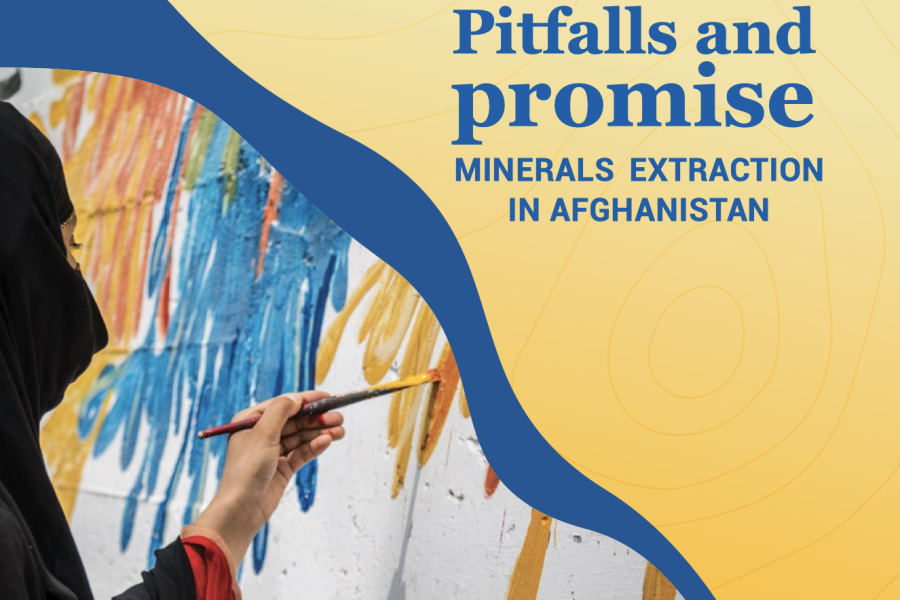Afghanistan Human Development Report 2020
25 August 2020
Pitfalls and Promises: Minerals Extraction in Afghanistan
Kabul, August 25, 2020 – Today, UNDP Afghanistan launched its National Human Development Report on minerals extraction in Afghanistan. The report is based on extensive field work, substantive consultation with civil society, private sector, government and UN agencies, and focused group discussions with communities living around mines.
National Human Development Report (NHDR) 2020, provides rich insights into the present situation of Afghanistan’s extractive industry. The Report elaborates on the interaction with various dimensions of human development, employment and investment opportunities in the extractive industry value chain, and more importantly its fiscal revenue potential. NHDR 2020 also assesses the country’s current state of human development, and the potential contribution and risks of the extractive industry. The Report focuses on 6 value chains which includes lapis, talc, onyx, chromite, oil and copper. NHDR is examines the pitfalls and promises in extractive industries, as well as challenges and shortcomings, and provides recommendations and solutions from a human development perspective.
Legal and sustainable extraction of mines is a driver for peace, development, and economic growth, but It is important to have a vision of how the benefits will reach the people before starting extraction. Decades of mining without a clear vision not only has not helped reduce poverty but has triggered local conflicts and harmed the environment. The report proposes requirements of conducting the Environmental Impact Assessment (EIA) through site inspections and monitoring to require certain health and safety standards and environmental impact mitigation.
Illegal mining is a complex phenomenon, contributing to insecurity, corruption, human rights violations and conflict that affects lives of citizens. Unregulated mining feeds and is fed by conflict. It has become the magnet of corrupt individuals and networks, and some mining businesses are implicated in serious human rights violations, often acting with impunity. Rent seeking by powerful individuals, corruption among officials, and insecurity in large parts of the country facilitate illegal mining.
The resource curse in its political dimension is characterized by rapid resource-led growth accompanied by large inflows of revenues to the government and to extractive companies, which leads to reduced accountability, increase in corruption, and collision between corrupt officials and businesses. The legal and regulatory framework provides the foundation on which mining operations can take place. There are several areas within the legal framework that may be conducive to corruption. The Report identifies such areas for reform and provides recommendations to enhance transparency and accountability
The report also provides a glimpse of unemployment, inadequate access to health care, low levels of education, water shortages, multidimensional poverty, increased vulnerability of young people, peace priority, and provides specific recommendations on preventing loss of fiscal revenues, protecting people and the environment and promoting a legitimate and responsible extractive industry based on the global experiences.
“In Afghanistan, there is an urgent need to improve governance, tackle corruption and put an end to illegal extraction and trade of minerals” said Abdallah Al Dardari, UNDP Resident Representative for Afghanistan. “Large-scale mineral, oil and gas projects can be instrumental for financing development, but it will require stability and enhanced government capacity to get its due share from these projects and use them well for human development” he added.

The Report recommends that all partners implement programmes demonstrating good practices, methods and technologies in mining. It is critical to strengthen the capacity of informal, small and medium-scale businesses. These programmes can include studies commissioned to understand the economics of small- and medium-scale mines, training to spread the use of better methods and technologies, and awareness raising on the environmental impacts. Such methods and technologies can include general management skills, better mine and quarry planning, mine benching, safer methods and procedures, using less environmentally damaging methods, safe use and disposal of explosives and chemicals, post-mine rehabilitation and restoration, recycling of waste and the like. All of the above areas are broadly illustrated in the report for relevant entities.
“I welcome the release of the report and look forward to our collaboration with UNDP and other partners on the opportunities explored by this report on the potential of economic growth through extractive industries” said acting Minister of Mines and Petroleum Haroon Chankhansuri. The minister added “the recommendations on policy choices to ensure people benefit from and participate in extractive industries potential, and mitigating the risks associated with this type of development will be considered in the government’s plans for the sector.”
UNDP Afghanistan’s new programmes, Afghanistan Sustainable Development Goals (A-SDGs) and Agenda 2030 is focused on transferring the war economy into peace economy, whereas, extractive industries is the key sector for revenue generation for and economic growth. Investment in this area is a top priority of UNDP interventions. UNDP is committed to support the government of Afghanistan develop the sector with improved regulatory framework and innovative methods.

















